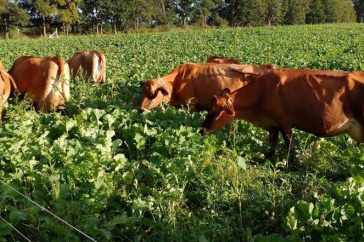The University of New Hampshire inspires innovation and transforms lives in our state, nation and world. More than 16,000 students from all 50 states and 71 countries engage with an award-winning faculty in top-ranked programs in business, engineering, law, health and human services, liberal arts and the sciences across more than 200 programs of study. A Carnegie Classification R1 institution, UNH partners with NASA, NOAA, NSF and NIH, and received $260 million in competitive external funding in FY21 to further explore and define the frontiers of land, sea and space.
UNH Scientists Present Research at 2019 NH Farm and Forest Expo

Cows grazing in brassica. Credit: Andre Brito
DURHAM, N.H. – How can farmers extend their forage production season in New Hampshire? How can soil microbes improve farm and forest productivity? Researchers with the NH Agricultural Experiment Station at the University of New Hampshire will present their latest research on these topics at the 2019 New Hampshire Farm and Forest Expo Friday, Feb. 1, 2019, at 2 p.m. The two 45-minute education sessions, free and open to the public, will be held in the Hale Room of Doubletree by Hilton, 700 Elm Street, Manchester.
Andre Brito, associate professor of agriculture, nutrition, and food systems, and Richard Smith, associate professor of natural resources and the environment, will present research on alternative strategies for improving forage production and season extension in pasture-based dairy. The forage production season in New Hampshire is often short and can be highly variable. This presentation will address several strategies for extending the forage production season, including annual forage crops intended to fill the “gaps” in the typical pasture growing season and the use of silvopasture. Brito and Smith also will share research results regarding the effects of brassicas on milk production and methane emissions.
Experiment station scientist Stuart Grandy, associate professor of natural resources and the environment, will discuss why soil health matters and how soil microbes can improve farm and forest productivity. Soil organic matter is vital to promoting soil health and farm and agroecosystem sustainability. Building soil organic matter requires the building of the microbial community. Microbial communities that are large active and efficient are the key to building soil organic matter building on farms and in forests.
This material is based upon work supported by the NH Agricultural Experiment Station, through joint funding of the National Institute of Food and Agriculture, U.S. Department of Agriculture, under award numbers 1017808, 1010680, and 1003421, and the state of New Hampshire.
Founded in 1887, the NH Agricultural Experiment Station at the UNH College of Life Sciences and Agriculture is UNH’s original research center and an elemental component of New Hampshire's land-grant university heritage and mission.
PHOTOS AVAILABLE FOR DOWNLOAD
https://colsa.unh.edu/nhaes/sites/colsa.unh.edu.nhaes/files/media/images/soil.jpg
The progression of the development of soil as organic matter accumulates during a lab experiment. Credit: Stuart Grandy Lab
https://colsa.unh.edu/nhaes/sites/default/files/media/images/cowsgrazinginbrassica.jpg
Cows grazing in brassica. Credit: Andre Brito
-
Media Contact
Lori Tyler Gula, PhD | NH Agricultural Experiment Station | lori.gula@unh.edu | 603-862-1452
Latest News
-
June 18, 2024
-
June 18, 2024
-
May 17, 2024
-
May 14, 2024
-
May 7, 2024

















































